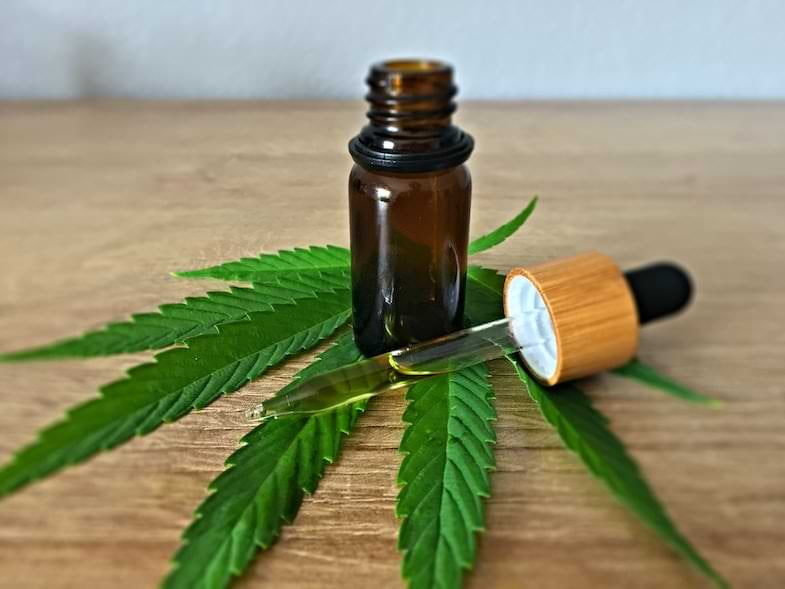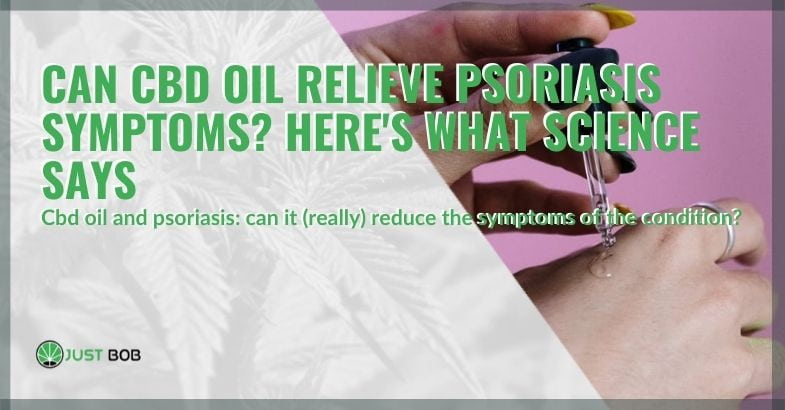Modified on: 17/01/2024
CBD OIL FOR PSORIASIS: CAN IT (REALLY) REDUCE THE SYMPTOMS OF THE CONDITION?
CBD oil has several benefits, and some have wondered if this also applies to psoriasis.
And if you’ve opened this article, you’ve probably wondered that yourself.
But it’s also likely that taking a trip around the web. You’ve noticed some confusion and conflicting opinions, which leads most people to be wary of this product and dismiss the idea of trying it.
To put it bluntly, would you ever go to eat in a restaurant that has collected only negative reviews?
I don’t think so.
But are we sure that CBD oil does not work on this condition?
To answer this question, in this article, we have gathered vital information that would prove the actual effectiveness of CBD oil against psoriasis symptoms.


Understanding Psoriasis: Causes, Symptoms, and Potential Treatment Approaches
Psoriasis is a chronic and inflammatory skin disease that affects millions of people worldwide. This condition, often accompanied by psoriatic arthritis, can significantly impact an individual’s quality of life. In this comprehensive guide, we will explore the nature of psoriasis, its causes, symptoms, and potential treatment options, including the emerging role of CBD products.
The Basics of Psoriasis:
Psoriasis is characterized by the rapid and abnormal growth of skin cells. In a healthy human body, skin cells are produced and shed in a controlled manner. However, individuals with psoriasis experience an accelerated turnover of skin cells, leading to the accumulation of thick, red, and scaly patches on the skin’s surface.
Causes and Triggers:
The exact cause of psoriasis is not fully understood, but it is widely recognized as an autoimmune disorder. The immune system mistakenly targets healthy skin cells, triggering an inflammatory response that accelerates skin cell growth. Certain factors, such as genetic predisposition, environmental triggers, and a compromised immune system, can contribute to the development of psoriasis.
Symptoms and Types:
Psoriasis manifests in various forms, with plaque psoriasis being the most common. This type presents as raised, red patches covered with silvery scales. Other types include guttate, inverse, pustular, and erythrodermic psoriasis, each exhibiting distinct characteristics. Psoriasis patients may also experience chronic pain, especially during psoriasis flare-ups.
Treatment Approaches:
While there is no known cure for psoriasis, various treatments aim to alleviate symptoms and manage the condition effectively. Conventional treatments include topical steroids, oral medications, and phototherapy. However, recent attention has turned to alternative approaches, such as CBD for psoriasis treatment.
CBD and Psoriasis Treatment:
CBD, or cannabidiol, derived from the cannabis plant, has gained recognition for its potential therapeutic properties. CBD products, including CBD oil, are being explored for their anti-inflammatory effects, which may help alleviate psoriasis symptoms. Some individuals report relief from skin irritation, reduced inflammation, and improved skin hydration when using CBD.
Safety Considerations and Product Selection:
As interest in CBD for managing psoriasis grows, it’s essential for individuals to exercise caution. The National Psoriasis Foundation emphasizes the importance of consulting with a healthcare professional before incorporating CBD into a treatment regimen. Product manufacturers have addressed safety concerns, and approved nonprescription CBD products, particularly those labeled as broad-spectrum or hemp-derived, are generally considered safe.
Psoriasis is a complex and chronic skin condition that can significantly impact the lives of those affected. While there is no known cure, various treatment approaches aim to manage symptoms and improve overall skin health. The emerging interest in CBD for psoriasis treatment offers a potential alternative or complementary option, but individuals should approach it under the guidance of healthcare professionals to ensure safety and efficacy. As research continues, the hope is that new insights and treatments will provide relief for individuals managing psoriasis and its associated challenges.
Exploring CBD as a Complementary Treatment for Psoriatic Arthritis and Psoriasis
Psoriatic arthritis, an autoimmune condition characterized by joint inflammation, often accompanies psoriasis, a chronic inflammatory skin disease. As the medical community delves into innovative approaches to managing these conditions, the potential benefits of CBD (cannabidiol) have emerged as a topic of interest. In this exploration, we examine the relationship between CBD and psoriatic arthritis, shedding light on the promising avenues for alleviating symptoms.
Understanding Psoriatic Arthritis and Psoriasis:
Psoriatic arthritis occurs when the immune system mistakenly attacks healthy joints and skin cells, leading to inflammation. Psoriasis, on the other hand, manifests as red, scaly skin lesions resulting from an accelerated skin cell growth cycle. While there is no known cure for these conditions, various treatments aim to manage symptoms and improve the overall quality of life for affected individuals.
CBD for Psoriasis Treatment:
Research in medicine and health sciences has explored the potential of CBD products, including CBD oil, in treating psoriasis and its accompanying arthritis. CBD, derived from the cannabis plant, contains compounds known as cannabinoids, which interact with the body’s endocannabinoid system. CBD’s anti-inflammatory effects make it a compelling candidate for managing chronic inflammation associated with psoriatic disease.
Anti-Inflammatory Effects of CBD:
CBD’s anti-inflammatory properties may be particularly beneficial for individuals experiencing psoriasis flare-ups and chronic pain associated with psoriatic arthritis. By interacting with immune cells, CBD modulates the immune response, potentially reducing the inflammatory cascade that contributes to skin and joint symptoms.
Skin Health and CBD:
CBD’s influence on skin health goes beyond its anti-inflammatory effect. Studies suggest that CBD may enhance skin hydration and wound healing, promoting the overall well-being of the skin. Topical application of CBD products, such as broad-spectrum CBD or hemp-derived CBD, has shown promise in managing skin conditions and potentially addressing psoriatic skin lesions.
Safety Considerations and CBD Dosage:
As interest in CBD for psoriasis and psoriatic arthritis grows, it’s essential for individuals to approach its use cautiously. Product manufacturers have addressed safety concerns, and approved nonprescription CBD products are available. However, consulting with a healthcare professional is advisable to determine the most appropriate CBD dosage and ensure that CBD does not interact negatively with other medications.
Clinical Trials and Future Prospects:
While anecdotal evidence and early research suggest the potential health benefits of CBD for psoriatic disease, ongoing clinical trials will provide more conclusive data. The National Psoriasis Foundation and institutions like the George Washington School are actively involved in researching CBD’s efficacy in managing psoriasis symptoms.
CBD presents itself as a complementary treatment option for psoriatic arthritis and psoriasis, offering anti-inflammatory and skin health benefits. While CBD cannot replace conventional treatments, it may provide relief for individuals managing these conditions. As research in this field continues, individuals are encouraged to explore CBD as part of a comprehensive approach to managing psoriatic disease, ensuring they do so under the guidance of healthcare professionals for optimal safety and efficacy.
What is CBD and why can it be beneficial for psoriasis?
Cannabis is a plant that contains more than 80 biologically active chemical compounds known as cannabinoids, which have several biological activities in the body, including anti-inflammatory, antioxidant and psychological effects.
CBD oil could be a good ally in alleviating psoriasis symptoms because of its properties.
Let’s see why.
Despite numerous highly effective topical and systemic treatments for psoriasis, many patients continue to suffer from chronic itching and pain. Not to mention that they have to deal with the stigma and psychosocial consequences of an apparent skin condition.
It is not surprising, therefore, that patients suffering from this disease have sought relief through a range of alternative treatment options, including cannabis-based products such as CBD.
The medical community has barely scratched the surface regarding cannabis-derived products’ potential benefits and risks.
However, the biochemical impact of CBD on the body must be considered carefully.
Many variables, including: determine its effects:
- the method of administration to the body (topical application, inhalation, oral ingestion);
- the dose or concentration of the cannabinoid;
- the specific chemicals isolated from a particular plant variety.
However, it is a very reasonable hypothesis that the potential beneficial effects of cannabinoids on psychological (e.g. anxiety reduction) and anti-inflammatory levels may help to alleviate the disease burden associated with psoriatic disease.
But how does it work in detail?
Read also: CBD oil: positive and negative effects on the body
How does CBD work for psoriasis?
CBD and other cannabinoids interact with the body’s endocannabinoid system (ECS).
The ECS consists of two receptors, CB1 and CB2, which are found throughout the body and help the brain communicate with the rest of the body.
But what is CBD’s role in all this?
In a nutshell, it interacts with these receptors and influences their activity; these interactions can help to:
- reduce inflammation
- relieve pain;
- support the immune system;
- reduce a range of other symptoms.
CB1 receptors are also found in the skin, which gives CBD, present in CBD flowers, the potential to affect this organ as well. In this regard, studies have shown that CBD’s interaction with these receptors can positively impact psoriasis and other chronic skin diseases.
Experts also suggest that CBD may slow down skin overgrowth, reducing the accumulation of excess skin cells involved in psoriasis eruptions.
In addition, CBD’s anti-inflammatory and pain-relieving qualities help reduce the swelling, joint pain, redness, and irritation associated with psoriasis.
Although research on the effects of CBD on psoriasis is still in its infancy, existing studies support the positive results of patients who have used it.


Which CBD product to choose for psoriasis?
CBD is available in several forms, including:
- topical products, such as creams, lotions, balms
- oils and tinctures;
- edibles, such as snacks, candies, beverages and other foods;
- capsules and gummies;
- vaporisers.
But which form of CBD is best for treating psoriasis? So far, it is unclear because there is insufficient research on the subject.
Oils and tinctures are popular among people with psoriasis and, anecdotally, are often said to be effective.
Other people, on the other hand, opt for topical treatments to be applied directly to the skin; lotions and creams, in fact, often include moisturising ingredients that may help soothe the symptoms of psoriasis.
It is always a good idea to consult your doctor and evaluate all possible solutions to relieve psoriasis symptoms effectively.
Read also: Bread with hemp flour: how it is prepared and what are its effects
Conclusions
In this article, we have discussed the potential benefits of CBD oil in alleviating psoriasis symptoms.
As you may have noticed, studies have shown that CBD can reduce the swelling, redness and joint pain caused by this condition.
Due to its interaction with the endocannabinoid system, CBD affects the action of CB1 receptors and would help slow down the process of skin overgrowth.
Many people use this product for its anti-inflammatory and pain-relieving properties.
If you are looking for the best CBD oil, visit the Justbob website and find all the latest news! We are waiting for you!









